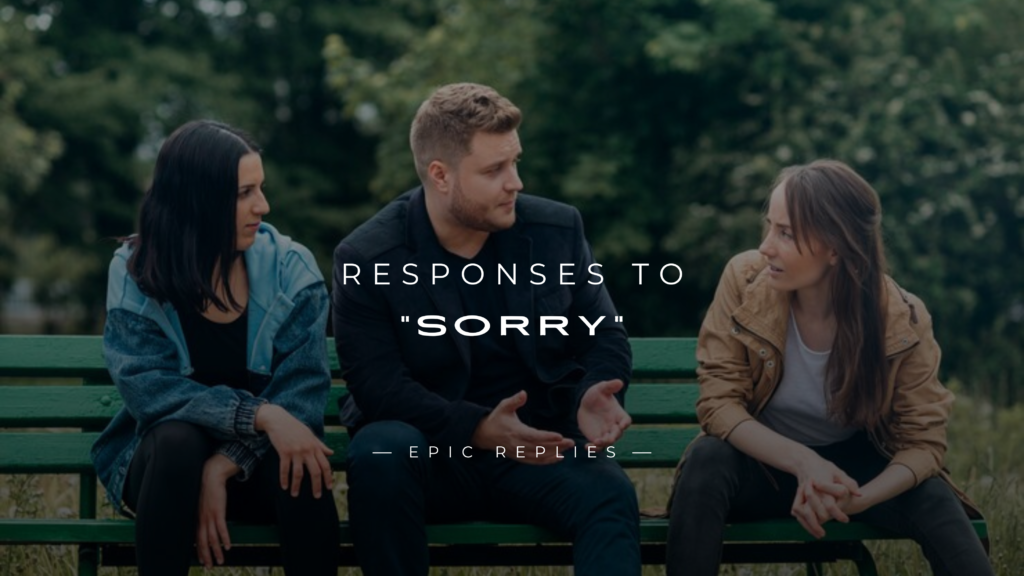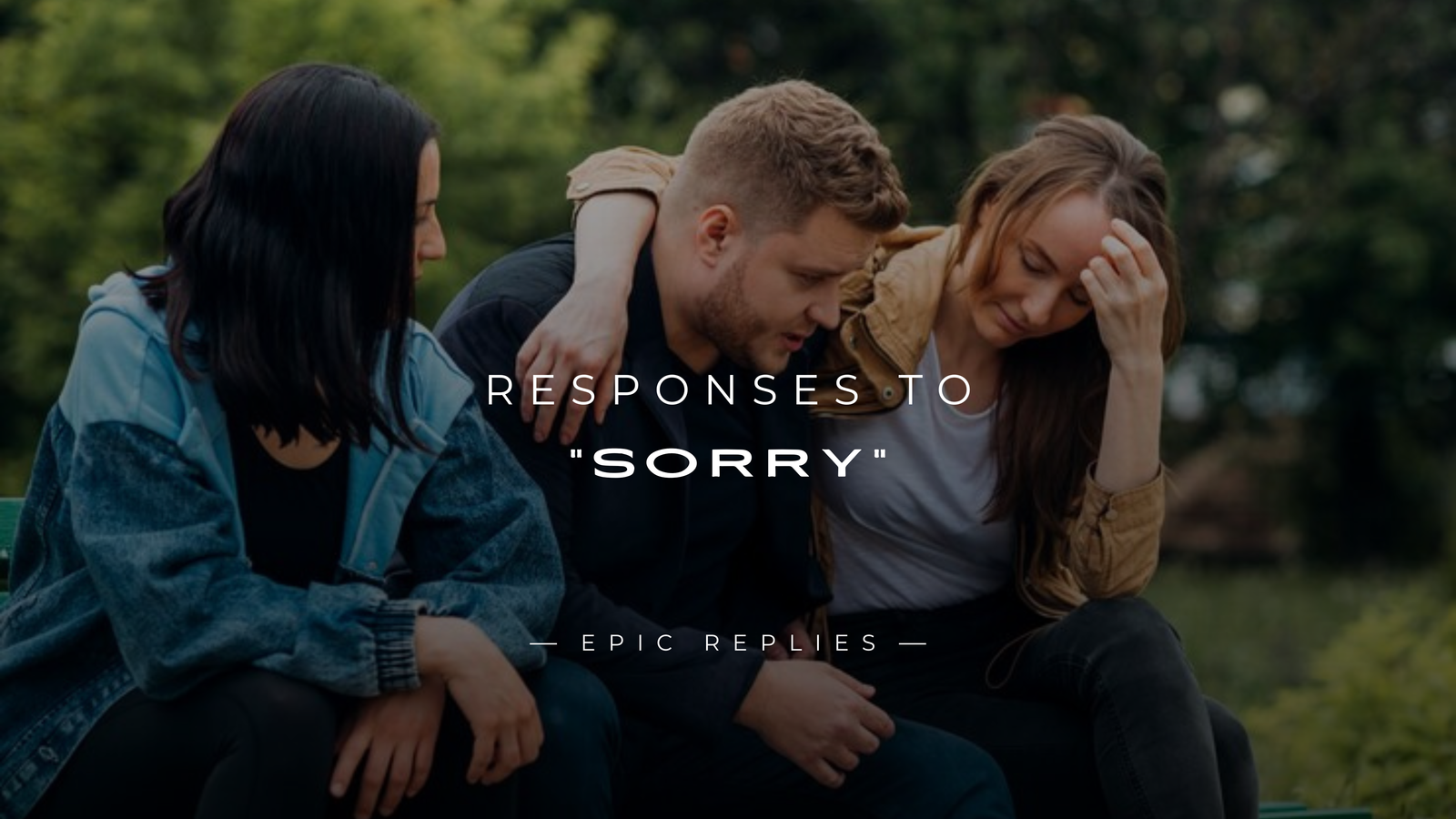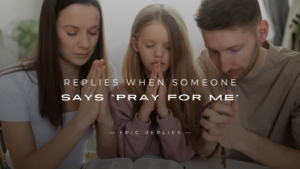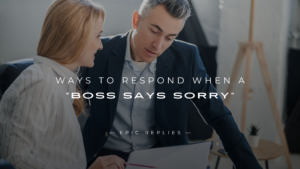When someone says “sorry,” it’s more than just a word—it’s a tool for communication. “Sorry” conveys an apology, expresses regret, or serves as an attempt to mend a situation. Whether the apology is casual or deeply heartfelt, how we respond to it has a significant impact on the outcome of that interaction. Understanding how to respond to “sorry” isn’t always straightforward, as the context, relationship, and situation play key roles. Let’s take a closer look at how to navigate these responses with care, whether you’re dealing with a personal friend or a professional colleague.

220+ Responses to “Sorry”
Acceptance
- It’s alright, really!
- No need to apologize. It’s all good.
- Don’t worry about it, I’m not upset.
- All is forgiven, no harm done.
- Hey, it’s okay, it happens!
- No worries at all.
- We’re fine, don’t stress about it.
- You don’t need to apologize, we’re good.
- Everything’s cool, don’t think twice about it.
- It’s all fine, really.
Reassurance
- Seriously, it’s no big deal.
- I’m not upset, so don’t worry.
- You’ve got nothing to worry about.
- It’s okay, I promise.
- No need to feel bad about it.
- I’m totally fine, really.
- You didn’t do anything wrong.
- It’s all good, nothing to stress about.
- I’m not mad, everything’s alright.
- We’re still cool, don’t worry.
Forgiveness
- Don’t worry, I forgive you.
- It’s okay, I’ve already forgiven you.
- It’s all in the past now, you’re forgiven.
- No hard feelings at all.
- I know you didn’t mean it, so all is forgiven.
- We all make mistakes, and I forgive you.
- You’re forgiven, no need to apologize further.
- I’m letting it go, it’s okay.
- It’s fine, I’ve moved on from it.
- It’s forgotten, you’re forgiven.
Understanding
- I get it, I know that wasn’t your intention.
- I can see where you’re coming from.
- I understand, we all slip up sometimes.
- Don’t worry, I know you didn’t mean it like that.
- It’s okay, I understand things happen.
- I get how you feel, it’s not a big deal.
- I understand, it’s not the end of the world.
- I see what happened, and I’m not upset.
- It’s okay, I understand why that happened.
- I totally understand, don’t worry about it.
Empathy
- I know that wasn’t easy to say, but I appreciate it.
- I get how that might’ve been stressful for you, no worries.
- I can tell you feel bad about it, but it’s alright.
- I understand how you feel, it’s all good.
- I know you’re genuinely sorry, and I appreciate it.
- It’s alright, I can tell you didn’t mean it that way.
- I can imagine that was tough, but it’s fine.
- I understand it wasn’t intentional, don’t worry about it.
- I know you’re feeling bad, but it’s really okay.
- I know it wasn’t your fault, and I’m not upset.
Humor
- Well, I’m still not going to let you off the hook that easily!
- You’re lucky I’m in a forgiving mood today!
- Apology accepted… this time!
- Next time, just bring me coffee and we’ll call it even!
- I’ll let it slide, but only because I’m in a good mood.
- I guess we’re even now… I’m kidding, it’s all good!
- I’m not mad, but I might start charging you for these apologies!
- You’re off the hook this time, but I’m keeping track!
- I’m accepting your apology, but I’ll make you pay with a pizza later.
- It’s okay, just don’t do it again or I’ll start a tab!
Deflection
- Honestly, don’t even worry about it, it’s nothing.
- You don’t have to apologize, it’s really not a big deal.
- It’s totally fine, let’s just move on.
- Honestly, I’m not bothered at all.
- It’s nothing, don’t stress about it.
- Seriously, it’s not a big deal. We’re good.
- You don’t have to keep saying sorry, everything’s fine.
- It’s all good, let’s just forget about it.
- It’s no problem, seriously.
- Don’t give it another thought, it’s nothing!
Acknowledgement
- Thank you for saying that.
- I appreciate your apology.
- It means a lot that you said sorry.
- Thanks for acknowledging that.
- I hear you, and I appreciate it.
- Glad you brought it up, thank you.
- That’s kind of you to apologize.
- I see that, and I appreciate your honesty.
- Thanks for being upfront about it.
- I appreciate you taking responsibility.
Reaffirmation
- We’re good, no worries.
- It’s totally fine, really.
- All is forgiven, we’re okay.
- We’re still cool, don’t worry.
- Nothing has changed, we’re fine.
- It’s all good between us.
- We’re on the same page now.
- We’re okay, don’t stress about it.
- We’re fine, this doesn’t change anything.
- You and I are still good.
Sarcasm
- Oh, well now everything is magically better!
- Wow, a ‘sorry’ fixes everything!
- Oh sure, that makes it all okay… not.
- Guess I can sleep peacefully now!
- Apology accepted… pending review!
- Wow, you must feel so much better now!
- Problem solved… in theory.
- Well, that was easy, wasn’t it?
- Good to know a ‘sorry’ is the magic word!
- Ah yes, the ancient art of saying sorry and moving on!
Encouragement
- It’s okay, learn from it and move on.
- Don’t beat yourself up over this.
- We all make mistakes, it’s how we grow.
- Keep your chin up, it’s not the end of the world.
- You’re doing fine, don’t let this get you down.
- Let’s focus on making things better now.
- It’s okay, you’ve got this.
- Mistakes happen, what matters is you care.
- Don’t worry, tomorrow’s a new day.
- You’re stronger than this little slip-up.
Lightheartedness
- It’s not like you crashed my car or anything!
- We’re still friends, so no worries!
- You didn’t ruin my day, promise!
- Relax, no one got hurt!
- It’s fine, nothing caught fire!
- If that’s the worst thing that happens today, I’m lucky!
- You’re still on my friend list!
- You didn’t break anything important, so we’re good!
- You’re forgiven… but I’m watching you!
- All is well in the universe again!
Apology Reciprocity
- I’m sorry too, let’s just move on.
- I should apologize as well.
- Honestly, I could’ve handled it better too.
- You’re sorry, and so am I.
- Let’s both call it even and move forward.
- It’s okay, I’ve made mistakes too.
- I’m sorry for my part in this.
- I should’ve said sorry earlier, too.
- I get it, and I’m sorry if I added to it.
- We both had a part, so I apologize too.
Clarification
- Can you tell me what exactly happened?
- I’m not sure what you’re sorry for—can we talk about it?
- Let’s clear this up together.
- Do you want to explain a bit more?
- I’d like to understand better, can you tell me more?
- I’m open to hearing what went wrong.
- Let’s figure out what happened so it doesn’t repeat.
- I just want to understand your side.
- Can you help me get the full picture?
- Let’s sort this out together.
Relief
- Phew, I’m glad you said something!
- That’s a weight off my shoulders.
- I’m relieved to hear that.
- Honestly, I was hoping you’d say that.
- I feel better now, thanks for clearing that up.
- Good, I was starting to wonder.
- Glad we’re on the same page now.
- That’s a relief, I didn’t want this hanging over us.
- I was worried for a second, but I’m good now.
- Thanks, I feel much better about it now.
Gratitude
- Thank you for apologizing, it means a lot.
- I really appreciate you saying that.
- Thanks for being thoughtful enough to say sorry.
- That was kind of you, thank you.
- I’m grateful you acknowledged it.
- I appreciate your honesty.
- Thank you, it shows you care.
- Thanks for taking responsibility.
- It means a lot that you came forward with this.
- Thanks, I respect you for saying that.
Nonchalant
- Eh, no big deal.
- It happens, don’t worry.
- Meh, I’m over it.
- No worries, life goes on.
- Not a problem, really.
- Whatever, it’s cool.
- Didn’t even notice, honestly.
- It’s fine, not worth stressing over.
- All good, doesn’t bother me.
- No biggie, seriously.
Playful
- If I had a dollar for every sorry I heard!
- Hmm, I might have to charge you a sorry tax!
- You owe me cookies now!
- I’ll accept your sorry… but only if there’s ice cream involved!
- Guess I can let it slide this time!
- Fine, but next time you owe me lunch!
- I forgive you… under protest!
- Only because you’re cute when you apologize!
- Alright, but I’m keeping score!
- Okay, but you still owe me one!
Indifference
- Doesn’t really matter to me.
- Whatever, it’s not important.
- I’m not bothered.
- Didn’t really affect me.
- It’s whatever, honestly.
- Doesn’t change anything for me.
- Not something I’m worried about.
- No feelings about it either way.
- Makes no difference to me.
- I’m indifferent, really.
Sarcastic Assurance
- Oh sure, everything’s perfect now!
- All fixed, like magic!
- Wow, your sorry totally solved it!
- Guess I can erase all my trauma now!
- Poof, problem gone!
- Amazing how a word can make it all better!
- Everything’s sunshine and rainbows now, thanks!
- Wow, why didn’t you say sorry sooner?
- Oh, well then, back to normal life I guess!
- Good to know everything’s fine now… totally.
Confusion
- Wait, what are you sorry for?
- I’m not sure what you mean.
- Did something happen?
- Why are you apologizing?
- I’m confused, can you explain?
- Sorry for what, exactly?
- I didn’t even notice anything wrong.
- You’ve lost me, what happened?
- Not sure what you’re talking about.
- What’s this about?
Self-Reflection
- I’ve made the same mistake before, so I get it.
- Honestly, I’ve been there too.
- I know how that feels, so no worries.
- Trust me, I’ve messed up like that before.
- I’ve done worse, so I’m not judging.
- I get it, I’ve been in your shoes.
- It happens, I’ve learned from my own slip-ups too.
- No big deal, I’ve had my moments too.
- I know the feeling, so I understand.
- Been there, done that — so it’s all good.
The Meaning Behind the Apology
The word “sorry” is a reflection of remorse or regret. It signifies that someone recognizes their actions, words, or behavior caused harm, discomfort, or inconvenience to another person. An apology is a form of acknowledgment that something went wrong. In some cases, it’s not about the apology itself but the genuine intent and feelings behind it. A well-meaning apology can lay the foundation for repairing broken relationships or smoothing over misunderstandings.
Why Apologies Matter in Communication
Apologies are crucial in communication because they help us maintain harmony and trust in our relationships. By responding thoughtfully to an apology, we create an opportunity for understanding, empathy, and growth. Ignoring or dismissing an apology can lead to further tension, while a considerate response fosters reconciliation.
Different Situations That Call for a Response to “Sorry”
The way you respond to “sorry” can vary greatly depending on the situation. Let’s break down a few common scenarios where someone might say “sorry” to you and explore how you can respond appropriately.
- Personal Apologies
In personal relationships, an apology could range from something minor like stepping on someone’s foot to much more serious matters like betrayal of trust. When responding to an apology, it’s important to consider the emotional context. Responding to a friend or family member’s apology with empathy and openness is often key to keeping the relationship intact.
- Professional Apologies
In a professional setting, you might encounter apologies for missed deadlines, poor communication, or mistakes in a work project. Here, a more measured and solution-oriented response is typically appropriate. While empathy is still important, the focus should be on moving forward and resolving the issue.
- Social Apologies
Sometimes, apologies in social settings are more casual and less emotionally charged. For example, someone may apologize for being late to a gathering or for accidentally interrupting you during a conversation. In these situations, a lighthearted and quick response can clear the air and prevent awkwardness from lingering.
Ways to Respond to “Sorry” in a Casual Setting
Not every apology requires a deep or complex response. In casual or everyday situations, your response to “sorry” can be short and simple. Let’s look at some ways to respond without overthinking the situation.
- A Simple Acknowledgement
When someone says “sorry” in a casual situation, sometimes the best response is a simple acknowledgment, such as “It’s okay,” or “No problem.” This lets the person know that their apology is received without adding any extra weight to the conversation.
- Offering Understanding
When you can tell that the person is genuinely sorry, showing empathy can make them feel heard. Saying something like, “I understand, don’t worry about it,” or “I know it wasn’t intentional” helps ease the situation without creating tension.
- Humor as a Response
If the apology is in a lighthearted context (like a minor social faux pas), humor can be a great way to diffuse any tension. For instance, “No worries, I’ve done worse!” or “You’re fine, but next time, bring snacks!” can turn the apology into a more playful moment.
- Using Non-Verbal Cues
Sometimes, words aren’t needed. A warm smile, a friendly nod, or a comforting gesture can speak volumes and show that you’re not upset by the situation. Non-verbal cues often convey understanding and reassurance more effectively than words in a relaxed environment.
Responding to “Sorry” in a Serious Situation
Serious situations call for a more careful and thoughtful response. When someone apologizes for something that deeply hurt or impacted you, your response will be more nuanced. Here’s how to respond to “sorry” when the stakes are higher.
- Offering Forgiveness
In situations where someone has wronged you, offering forgiveness in response to a heartfelt apology can be incredibly powerful. “I appreciate your apology, and I forgive you,” is a way to release tension and move forward. However, forgiveness is a personal decision, and it might take time before you’re ready to fully forgive.
- Acknowledging the Apology without Dismissing It
Sometimes, an apology requires more than just a “It’s fine” response. You might want to acknowledge that the apology has been heard but still express that the situation impacted you. A response like, “I hear what you’re saying, and I appreciate you apologizing,” shows that you’re not dismissing their apology, but you’re still processing the situation.
- Encouraging Open Communication
In serious matters, you may want to open the door for further dialogue. Encouraging the person to explain more or offering your own feelings can help foster healing. For example, “Let’s talk more about this so we can understand each other better” can pave the way for constructive communication.
What to Do When the Apology Feels Inauthentic
Not every apology is genuine, and sometimes, you might feel that the person isn’t truly remorseful. If this happens, it’s important to address it thoughtfully. Here’s how to handle an inauthentic apology.
- Assessing the Sincerity of the Apology
When an apology feels insincere, take a moment to evaluate the person’s tone, actions, and the context in which the apology was given. Is it simply a formality? Or is there a deeper level of regret being expressed? Your response will depend on this assessment.
- Setting Boundaries and Expectations
If you don’t feel the apology is sincere, it’s okay to express your feelings. You can say something like, “I appreciate your apology, but I need to see a change in behavior moving forward.” Setting clear boundaries ensures that the situation doesn’t repeat itself.
How to Respond to “Sorry” in Professional and Formal Contexts
When you’re in a work environment, responding to “sorry” requires professionalism. Whether the apology comes from a colleague, client, or supervisor, here’s how to respond in a way that maintains respect and professionalism.
- Acknowledge the Apology with Grace
In professional settings, it’s important to acknowledge the apology in a respectful manner. Responses like, “Thank you for your apology,” or “I appreciate you bringing that to my attention” show that you recognize the effort the person has made without making it personal.
- Offering Solutions Rather Than Dwelling on the Issue
In a workplace situation, you might want to move the conversation toward solutions instead of dwelling on the problem. A response like, “Let’s figure out how to avoid this in the future,” can help steer the conversation in a productive direction.
- The Importance of Professional Etiquette
In professional environments, it’s important to maintain a sense of decorum when responding to “sorry.” Remaining polite and solution-focused can help you maintain professional relationships and encourage effective teamwork.
Responses to “Sorry” in Text or Email
In today’s digital world, apologies often come through text messages or emails. Here’s how to handle these situations appropriately.
- Writing an Appropriate Response
A text or email apology usually requires a simple, quick response. “No problem at all!” or “Thank you for your message” works well in most situations, keeping things light and positive.
- When to Keep It Short
In cases where the apology isn’t serious, a brief response such as “It’s all good” or “Don’t worry about it” is sufficient and keeps the tone casual.
- When to Provide a More Detailed Reply
If the apology in the text or email pertains to a more significant issue, a detailed response may be necessary. You might say, “Thank you for your apology. I think it’s important we discuss this further when we can.”
The Psychological Impact of Responding to “Sorry”
Your response to an apology has more power than you might think. It can influence both you and the person offering the apology. Let’s explore the psychological effects of your reactions.
- How Your Response Affects the Other Person
Your response can have a profound impact on the person apologizing. If you respond with warmth and understanding, you help them feel validated and allow the apology to be a true form of resolution. On the other hand, a cold or dismissive response can make them feel unheard or rejected.
- The Role of Empathy in Apologies
Empathy plays a key role in responding to apologies. When you respond with empathy, you acknowledge the emotional impact of the situation and show that you care about how the other person feels. This creates a sense of mutual respect and can promote healing.
Common Mistakes to Avoid When Responding to “Sorry”
There are a few common mistakes people make when responding to “sorry” that can unintentionally harm the relationship. Here are some to avoid:
- Over-Accepting the Apology
While it’s important to forgive, over-accepting an apology without addressing the issue can lead to unresolved feelings. It’s better to acknowledge the apology but also have a conversation about what went wrong.
- Being Too Harsh in Your Response
If you’re hurt, it’s understandable to be upset, but responding too harshly can make the situation worse. A calm and balanced response can ensure that the relationship doesn’t suffer further.
- Not Addressing the Root Cause
Sometimes, simply saying “it’s okay” can avoid dealing with the underlying problem. It’s important to address the root cause of the situation, especially if it’s something that could happen again.
Conclusion
Wrapping up, having the right response to “Sorry” can really shape the tone of your conversations—whether you’re showing understanding, setting boundaries, or adding a touch of humor. With these 220+ options, you’re now ready to handle apologies in a way that leaves a meaningful impact. And if you’re looking to keep improving your daily interactions, don’t miss our list of 220+ Responses to “See You Tomorrow” For Every Situation for even more clever and thoughtful replies!
FAQS
Q. What should I do if the apology feels insincere?
Assess the situation carefully. If the apology seems forced, express how you feel about the situation and set expectations for the future.
Q. How should I respond if the person doesn’t seem to care about my feelings?
Address the issue directly by letting them know how their actions affected you, and make it clear what you need for resolution.
Q. Can humor be used when responding to “sorry”?
Yes! If the situation is lighthearted, humor can ease tension and make the conversation more comfortable.
Q. Should I always forgive when someone says “sorry”?
Forgiveness is personal. Only forgive when you genuinely feel ready, and it’s okay if you need time to process the apology.
Q. Is it okay to not respond to an apology?
Silence can be a form of response, especially if you’re still processing your feelings. However, addressing the apology in some way is often necessary for closure.




